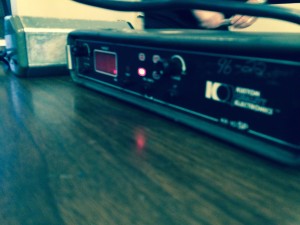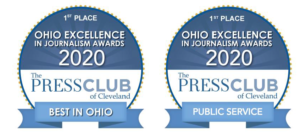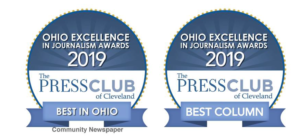Background: The Cleveland Heights Police Department has launched a Citizens Police Academy for members of the community who are interested in learning more about how the police department operates. The first course runs 6-9 p.m. on Monday and Tuesday evenings, for seven weeks beginning Aug. 11 and ending Sept. 30, 2014. This blog post is one of a series about my experience in the program. Click here for the full series.

If you happened to drive through the intersection of Monticello and Noble Roads between 8-9 p.m. on Monday, Sept. 15, there’s about a 100% chance somebody checked your speed.
If you were going too fast, you got a free pass because that somebody was most likely a cadet in the Cleveland Heights Citizens Police Academy – not certified to use the device for law enforcement purposes.
Here are a few things I learned on speed enforcement day at the academy:
- Skilled traffic enforcement officers know you’re speeding well before they put a radar gun on you. In fact, if you have access to a radar gun to validate your guesses, it doesn’t take more than 30 minutes of concentrated effort to become a pretty good judge of how fast passing cars are traveling.
- There is technique to using a radar gun and its high-tech cousin Lidar (same concept but with laser/light rather than radar/sound). Not as much technique, perhaps, as cooking a soufflé, but enough that some officers are better than others at catching speeders.
- Those who are better at it are the ones who are probably on duty when you’re going to too fast.
- Officers are on high guard when they make a traffic stop. Despite their ability to run license plates before approaching the vehicle, they never know the full story of the person or people inside the car (see my previous post about the routine traffic stop in Middlefield, Ohio that turned into a firefight). The surrounding traffic is equally dangerous and unpredictable. Combined, these factors make it one of the most dangerous routines of their job.
- When stopped here for speeding, the officer will likely ask if there’s a reason you were going too fast, according to Inv. Timothy O’Haire, who teaches traffic-stop techniques to cadets at the Cleveland Heights Police Academy. If you’re polite and the violation isn’t too severe, a good answer may get you off with a neighborly warning (not that it’s actually happened to me). “I’ve really gotta go to the bathroom,” is pretty common.
- Radar detectors don’t work well in heavy rain. The radar unit in the squad car to which I was assigned didn’t get more than four or five good reads in 45 minutes.
- Lidar, on the other hand, doesn’t seem to be as bothered by the weather.
- The police department uses both.
Residents and visitors to Cleveland Heights often have choice words about the priorities of our police department. They suggest the emphasis on traffic enforcement takes attention away from more serious crimes.
While I’ve generally assumed the CHPD has the resources to do both effectively, I have questioned the need – publicly stating my own concern that aggressive traffic enforcement presents an economic problem for the city.
When people fear that coming to Cleveland Heights is going to result in either getting mugged or getting a ticket, they’ll simply choose to spend their money elsewhere. Is that fear justified? It doesn’t matter; if they believe it they’ll act on it.
Over the last five years, I’ve asked various city officials about this and have never gotten a satisfactory answer why traffic enforcement is so important.
Last week, for the first time, I did.
“People know Cleveland Heights has a reputation about traffic enforcement, but what they don’t understand is that our traffic officers make a lot of arrests,” said Cpt. Geoffrey Barnard, commander of the Cleveland Heights Police Academy. “By making routine traffic stops they get a lot of bad people and guns and drugs off the street.”
There’s a passive benefit too; just as aggressive traffic enforcement may drive away honest people, it would seem to keep thieves and thugs out of the city too. Because if there’s something worse than getting stopped for speeding on your way to dinner and a movie, it’s getting stopped for speeding with large amounts of cash, drugs or weapons in the car.
It’s hard to measure something that doesn’t happen. So there’s no way to know how many crimes are averted here because the CHPD Traffic Bureau makes it too risky for criminals to even drive through the city. (Whatever the number is, I’m sure we can all agree that it would be nice if even more of them felt that way.)
Yet the argument makes sense, so I’m eating crow. I didn’t understand this constructive reason for all the speed traps. I feel better about traffic enforcement now that I do, and I’m going to stop complaining about it.
But it does still leave us with a problem: How do we keep more of the bad guys out of the city while making it more appealing to everyone else?
The police department isn’t the Chamber of Commerce – and we don’t want it to be. It’s not likely to ever address that question on its own.
But if anyone else could come up with a plan, I’m now confident our police officers have the training and desire to be a constructive part of it.



How does writing parking tickets help to keep our city safe? Can you make this the subject of your next blog?
I’m not sure anyone is going to make the case that parking enforcement and traffic enforcement do the same thing. At the Citizens Police Academy, there hasn’t been much talk about parking. But I’ve had conversations with city council members that enlightened me.
I hadn’t realized this, but the city must pay property tax on city parking lots. Which means it needs to collect parking fees in order to pay for them. Ironically, street parking isn’t taxed by the county – so the premium curbside parking doesn’t come with nearly as much cost.
The strict enforcement of parking strikes me as a combination of fairness (how can the city charge for parking if it isn’t going to fine scofflaws) and revenue. But this has not been part of the curriculum of the Citizens Police Academy.